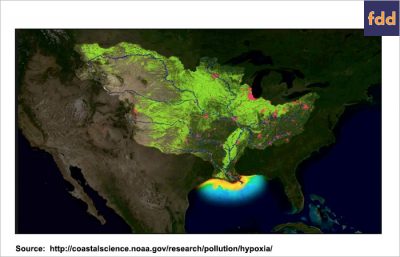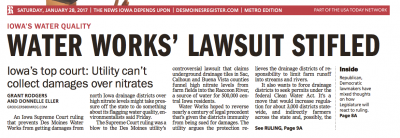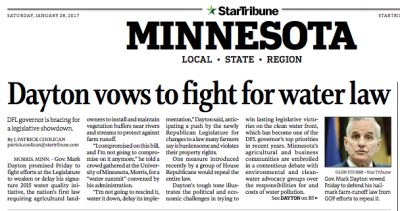The House Agriculture Committee advanced the Republican-led farm bill in a 34-17 vote early Thursday after a marathon markup that was clouded by partisan fighting about the package.
Water Quality– Iowa Case Resolves One Issue, Clean Water Act Permitting Issue Remains Open
Background
Nutrient-impacted water runoff from farm fields can have environmental consequences. A case filed by Des Moines Water Works (DMWW) involving financial damages from treatment of this water recently made its way to the Iowa Supreme Court. On Friday, January 27, the Iowa Supreme Court resolved one issue associated with the DMWW case; however, non-point source permitting issues under the Clean Water Act will still be considered by a trial court in June.
In a farmdoc daily article from February of last year (“Dead Zones & Drinking Water, Part 1: RCPP and Review“), University of Illinois Clinical Assistant Professor Jonathan Coppess discussed variables associated with nutrient-impacted water in the Mississippi River Basin and the effects that water could have on the environment:
Nutrients that feed growing crops cause problems in water, from local drinking water supplies to the hypoxic or dead zone in the Gulf of Mexico.
The farmdoc daily update noted that, “When [nutrients are] deposited by the Mississippi River, they feed algae that live in the Gulf’s warm waters. These algae can overtake an area and when they die the decomposition consumes oxygen, depleting the water of its supply and chasing out shrimp, fish and other aquatic species. Left behind is a hypoxic or dead zone in the water.”

Mr. Coppess pointed out that, “The Des Moines Water Works (DMWW) lawsuit filed in March 2015 against three Iowa drainage districts may well bring the nutrient loss issue much closer to home. The lawsuit challenges the general exemption for agricultural storm water discharges under the Clean Water Act, as well as raising nuisance and other claims for damages due to cleaning nitrates out of the Des Moines drinking water supply (see Policy Matters, February 3, 2015). The lawsuit focuses on nitrogen losses from tile-drained farmlands…”
More narrowly with respect to the DMWW lawsuit, Mr. Coppess explained back in March that, “Agriculture activities combined with natural events such as precipitation are exempt from the [Clean Water Act’s] direct regulatory reach. [The Environmental Protection Agency] regulations specifically include drainage in that exemption. The nitrates that DMWW is suing over originated in farm fields and in part from natural events. The DMWW lawsuit, however, raises the question as to how far down the tile system the exemption applies.
Specifically, it challenges whether the exemption still applies when the water reaches the rivers after it has been collected and carried through manmade drainage infrastructure.
Additional background and perspective on this issue was included in a Des Moines Register article from September, where reporter Grant Rodgers explained that, “Arguments in front of the Iowa Supreme Court on [Sept. 14] could determine whether Des Moines Water Works can win financial damages for nitrate pollution flowing into the Raccoon River.
“A ruling in favor of the central Iowa utility could significantly alter a century of legal precedent. For decades, agricultural drainage districts created to turn swampy, wet ground into valuable Iowa farmland have been protected from most lawsuits.”
The Register article added that, “Unlike cities or counties, these quasi-governmental entities are set up at the request of landowners to perform a very specific task: Move water out of flat Iowa fields that can’t drain themselves naturally so that farmers can plant crops. A drainage district is ‘merely an area of land,’ so it cannot be sued in civil court for monetary damages, the Iowa Supreme Court has ruled.
“That longstanding precedent could be upended by Des Moines Water Works’ controversial federal lawsuit against drainage districts in three northwest Iowa counties.”
(Click on the embedded tweet to hear Iowa producer Seth Smith explain the potential consequences for Iowa farmers if drainage districts were found to be liable for damages for nutrient runoff. “How do they decide who put the nitrate in the water? [O]r do we just all pay it together?”).
Sac Co. Farmer Seth Smith on the DMWW lawsuit https://t.co/WuZPCtiPPT -which the Supreme Court of Iowa ruled on Friday.
— Farm Policy (@FarmPolicy) January 28, 2017
In a separate Register article from September, Grant Rodgers pointed out that, “The possibility that farmers might have to make payments has fueled fears in the agriculture community since the outset of the lawsuit.”
Supreme Court of Iowa Ruling- Open Questions on Permitting Remain
Grant Rodgers and Donnelle Eller reported on the front page of Saturday’s Des Moines Register that, “An Iowa Supreme Court ruling that prevents Des Moines Water Works from getting damages from north Iowa drainage districts over high nitrate levels might take pressure off the state to do something about its flagging water quality, environmentalists said Friday.”

“Water Works hoped to reverse nearly a century of legal precedent that’s given the districts immunity from being sued for damages.”
However, the article added that:
[DMWW] also wants to force drainage districts to seek permits under the federal Clean Water Act. It’s a move that would increase regulation for about 3,000 districts statewide, and indirectly farmers across the state and, possibly, the nation. That portion of the lawsuit will still move forward toward a trial, slated for June.
And DTN writer Todd Neeley reported on Friday that, “Bill Stowe, chief executive officer and general manager of Des Moines Water Works, said in a statement to DTN the water utility would continue to pursue the case in federal court…’Unresolved questions of permitting and, ultimately regulation, are not addressed yet, and remain at the heart of the federal case…'”
Mr. Neeley added that, “If successful, it is believed the legal action could lead to regulating farm ground as a pollution point source in Iowa and perhaps across the country if legal fever spreads. It could require farmers to pay for expensive permits for normal farm practices, as well as restrict the use of fertilizer or other farm chemicals.”
A “Q and A” summary of the DMWW case posted on Friday at the Des Moines Register Online indicated that, “The Iowa Supreme Court ruled that Des Moines Water Works cannot win damages under the Iowa Constitution against drainage districts in the three counties it is suing;” and added that, “Another portion of the lawsuit is set for trial in June. Those claims deal with whether drainage districts should be considered point-source polluters under the federal Clean Water Act, which would require them to get permits and be subject to additional oversight.”
Related Issue in Minnesota
In a related issue regarding agriculture and water from Minnesota, J. Patrick Coolican reported in Saturday’s Minneapolis Star Tribune that, “Gov. Mark Dayton promised Friday to fight efforts at the Legislature to weaken or delay his signature 2015 water quality initiative, the nation’s first law requiring agricultural landowners to install and maintain vegetation buffers near rivers and streams to protect against farm runoff.”

The article added that, “Dayton’s tough tone illustrates the political and economic challenges in trying to win lasting legislative victories on the clean water front, which has become one of the DFL governor’s top priorities in recent years. Minnesota’s agricultural and business communities are embroiled in a contentious debate with environmental and clean-water advocacy groups over the responsibilities for and costs of water pollution.”





